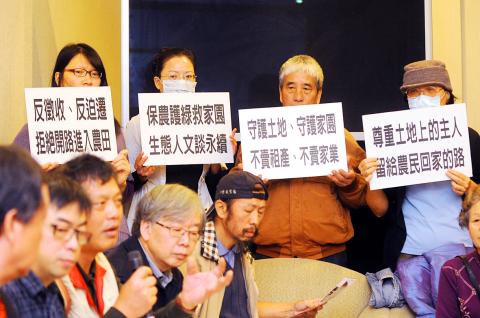Farmers from Tamsui District (淡水) in New Taipei City (新北市) yesterday protested against a town project proposed by the Construction and Planning Agency (CPA) on concerns that, in addition to forced land seizures, the project could damage the local environment.
“I live in a small house with a small plot of land attached to it. I grow vegetables on the land for my own consumption,” a local land owner in her 60s, Su Shu-yuan (蘇淑媛), said at a news conference at the legislature. “I don’t live a fancy life, but I’d say my life is good — what am I going to do if you [the government] take away my land?”
She said that, in order to keep her land, she has expressed her opposition to the land expropriation in letters to the Presidential Office, the CPA, the Control Yuan, the Ministry of the Interior and the New Taipei City Government, “but none of them seemed to really care about what I asked for.”

Photo: Wang Yi-sung, Taipei Times
“I know you are trying hard to convince us, but I am absolutely opposed to the project. Don’t even think about taking my land. I want to live the way I’ve always lived,” she added.
Su, as well as thousands of other homeowners in the area, are in a panic because the second phase of the Tamhai New Town (淡海新市鎮) project is to undergo a final review next month, and land expropriations could start as soon as the project is approved.
The Tamhai New Town project is an urban planning project first proposed in 1992 to create a new town using 1,756 hectares of land — covering as many as six farming villages — north of central Tamsui to relocate 300,000 people from the overcrowded Taipei metropolitan area.
After 20 years of development, the first phase of the project has been completed on 446 hectares. However, while the first-phase area was designed for 130,000 people, only 13,000 have moved in so far.
The second phase of the project, on the other hand, covers 1,168 hectares of land — which includes 871.33 hectares of farmland that is mostly still being used for agricultural production.
Huang Jui-mao (黃瑞茂), an associate professor in Tamkang University’s Department of Agriculture, called the second phase a “lie.”
“Despite investments made in the past 20 years, the majority of housing units are still unsold, while as many as three-fourths of the land in the first phase of the new town project is still unoccupied,” he said. “How could you move on to the second phase now, especially as the surface area of the second phase is much larger than the first?”
He added that, as food shortages are becoming a global concern and food self-sufficiency is a problem in Taiwan, “why would you take over farmland on the edge of a metropolitan area for development?”
Huang Tsung-chuan (黃宗傳), a local farmer, raised doubts about traffic and environmental issues.
“Tamsui is connected to Taipei via a narrow strip. The traffic is already very bad now, how can we handle another 300,000 residents?” Huang said. “The government wants to build an elevated expressway through the mangrove forest along the Tamsui River [淡水河], but this is going to severely damage the mangrove ecosystem.”
CPA Director-General Yeh Shih-wen (葉世文), who appeared at the press conference, said he would raise residents’ concerns in the review meeting.

Taiwan has received more than US$70 million in royalties as of the end of last year from developing the F-16V jet as countries worldwide purchase or upgrade to this popular model, government and military officials said on Saturday. Taiwan funded the development of the F-16V jet and ended up the sole investor as other countries withdrew from the program. Now the F-16V is increasingly popular and countries must pay Taiwan a percentage in royalties when they purchase new F-16V aircraft or upgrade older F-16 models. The next five years are expected to be the peak for these royalties, with Taiwan potentially earning

STAY IN YOUR LANE: As the US and Israel attack Iran, the ministry has warned China not to overstep by including Taiwanese citizens in its evacuation orders The Ministry of Foreign Affairs (MOFA) yesterday rebuked a statement by China’s embassy in Israel that it would evacuate Taiwanese holders of Chinese travel documents from Israel amid the latter’s escalating conflict with Iran. Tensions have risen across the Middle East in the wake of US and Israeli airstrikes on Iran beginning Saturday. China subsequently issued an evacuation notice for its citizens. In a news release, the Chinese embassy in Israel said holders of “Taiwan compatriot permits (台胞證)” issued to Taiwanese nationals by Chinese authorities for travel to China — could register for evacuation to Egypt. In Taipei, the ministry yesterday said Taiwan

Taiwan is awaiting official notification from the US regarding the status of the Agreement on Reciprocal Trade (ART) after the US Supreme Court ruled US President Donald Trump's global tariffs unconstitutional. Speaking to reporters before a legislative hearing today, Premier Cho Jung-tai (卓榮泰) said that Taiwan's negotiation team remains focused on ensuring that the bilateral trade deal remains intact despite the legal challenge to Trump's tariff policy. "The US has pledged to notify its trade partners once the subsequent administrative and legal processes are finalized, and that certainly includes Taiwan," Cho said when asked about opposition parties’ doubts that the ART was

If China chose to invade Taiwan tomorrow, it would only have to sever three undersea fiber-optic cable clusters to cause a data blackout, Jason Hsu (許毓仁), a senior fellow at the Hudson Institute and former Chinese Nationalist Party (KMT) legislator, told a US security panel yesterday. In a Taiwan contingency, cable disruption would be one of the earliest preinvasion actions and the signal that escalation had begun, he said, adding that Taiwan’s current cable repair capabilities are insufficient. The US-China Economic and Security Review Commission (USCC) yesterday held a hearing on US-China Competition Under the Sea, with Hsu speaking on